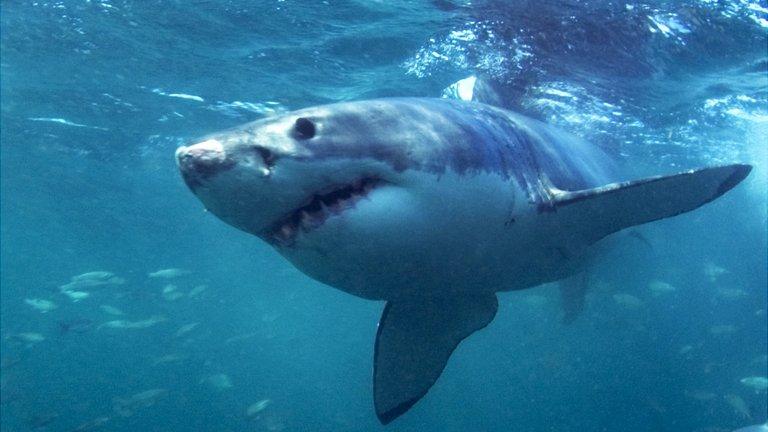Sharks take the fun out of Western Australia's beach culture
- Published
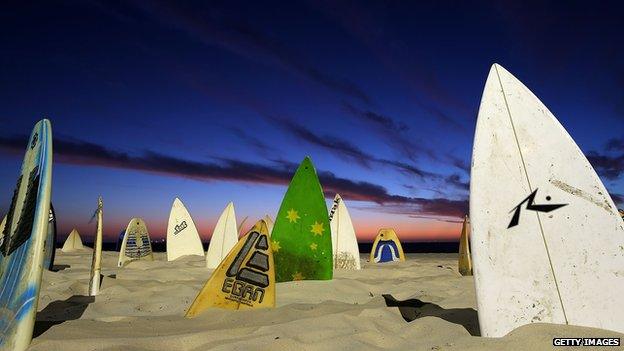
Some fear the sun is setting over Western Australia's beach lifestyle, thanks to panic over shark attacks
Fear and loathing about sharks risk killing Western Australia's laid-back beach lifestyle and producing a generation of children too frightened to swim at the beach, writes Louise Burke.
A few days before the end of last year, West Australian teenager Jay Muscat was killed by a shark while he was spear-fishing on the state's far south coast. Authorities closed the beach and issued a kill order for the shark.
A fortnight earlier, when Western Australians would typically have flocked to the beach, one of Perth's southern beaches was suddenly deemed out of bounds after an electronically-tagged great white shark was detected.
The shark repeatedly returned to Warnbro Beach during daylight hours, prompting authorities to close the popular swimming and sunbathing spot, and to set baited lines in the hope of catching and shooting it.
The two incidents follow a spate of deadly shark attacks in recent years in Western Australia and a controversial decision by the state government in early 2014 to cull sharks.
That decision was eventually aborted after the government's own environmental regulator said it was scientifically unjustified.
But critics say government and media hype around so-called killer sharks is not just environmentally dangerous - it also strikes deep into the state's psyche, damaging its relaxed coastal lifestyle, and generating a sense of fear and anxiety.
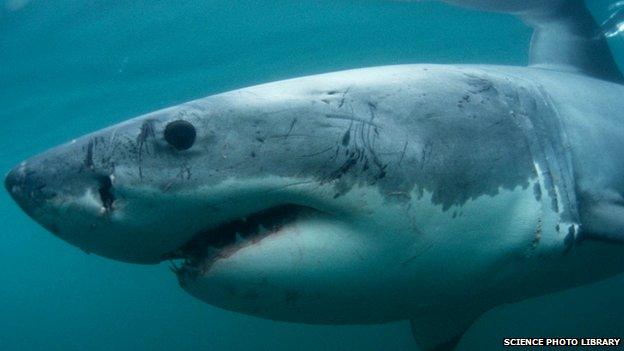
The great white shark is thought to be responsible for the deadliest attacks on humans in Australian waters
Some psychologists have gone as far as to suggest that a climate in which sharks are deemed to be "rogue" killers that should be shot risks producing a generation of children who will grow up scared of the beach.
And it's not just children who are scared, says Shayne Hanks, the Perth-based chairman of the National College of Sport and Exercise Psychologists.
"There are adults saying that they won't go in the water or won't swim out very far or they'll stop some of those activities, and that's because their sense of threat is heightened," he said.
Mr Hanks says the heightened fear of sharks is discouraging people from taking part in popular activities such as surfing.
"I think it makes people less likely to go to the beach, which makes them less active, doing less exercise," he says. "That sense of where the beach fits into our culture is changing."
'Wineries and sightseeing'
Mr Hanks says the threat from sharks, while real, has been exaggerated.
"I think the reaction isn't commensurate with the risk," he says. "We don't see the same anxiety levels in terms of drowning; there are more than 10 times the number of people who drown each year in WA [Western Australia] versus shark attacks; and there's 200 times the number of fatalities by car.
"We don't get anxious though [about] getting into our car, and we don't get anxious when we go into a swimming pool."
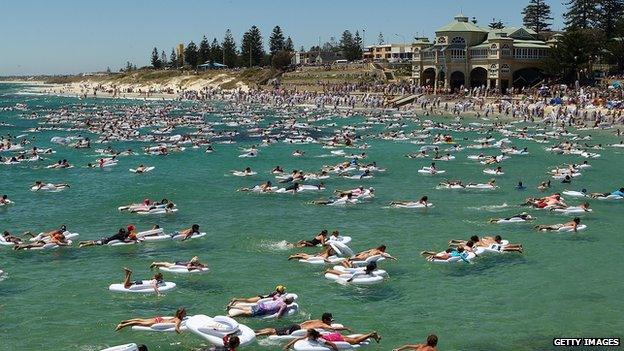
Relaxing at the beach is a cornerstone of Western Australian culture
Following Jay Muscat's death, the state's Premier Colin Barnett said he was concerned for the safety of people using the sea and feared more fatalities, "even young children".
His comments followed statements made ahead of the summer swimming season in September by then-Acting WA Tourism Minister John Day, who suggested tourists in the south-west may want to spend their holidays visiting wineries or scenic sights rather than venturing into the water.
"If it was me I would not be surfing or going swimming far off the coast," Mr Day said.
Changing habits
But critics say the idea that Western Australians who venture into the water will be hunted by killer sharks encourages lazy government policies.
In the December issue of the Australian Journal of Political Science, academic Christopher Neff wrote that the idea of "serial killer sharks" which must be culled was easier to peddle than explaining to the public that shark culls do not protect swimmers.
"A more scientific-based narrative meant telling the public that nothing can be done or that the government did not know what was going on," Mr Neff explains.
During an initial 13-week trial mid-last year, more than 170 sharks were caught by baited lines known as drum lines. However, none were Great White sharks, to which most of the recent fatal attacks had been attributed.
Premier Barnett reluctantly cancelled the program in September but a special agreement with the Federal Government means Western Australia can still hunt sharks that are considered a threat.
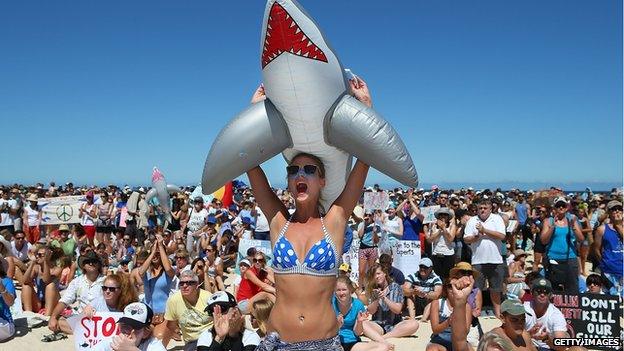
The plan to cull sharks has attracted fierce protests
The cull attracted a lot of opposition and protesters are now planning a third rally at Cottesloe Beach since culling began, for 1 February.
Locals are still going to patrolled beaches in big numbers, says Surf Life Saving WA. However, the way people use the beach is changing, according to its chief executive officer, Paul Andrew.
"The beach usage first thing in the morning [when sharks are prevalent] has dropped significantly but beach usage at other times has increased, particularly at patrolled beaches," says Mr Andrew.
"Beach behaviours have also changed with swimmers staying closer to shore, swimming in groups and swimming in greater numbers at times other than dawn and dusk," he says.
'Under threat from nature'
For cultural studies academic Jon Stratton, narratives around shark attacks are feeding into a cultural myth of Perth as an isolated suburban paradise, constantly in danger of losing its laid-back way of life.
"There's this sense that once upon a time, Perth was this utopia, this Arcadia, and now we've lost that - there are these terrible creatures threatening our lifestyle," says the retired Curtin University professor.
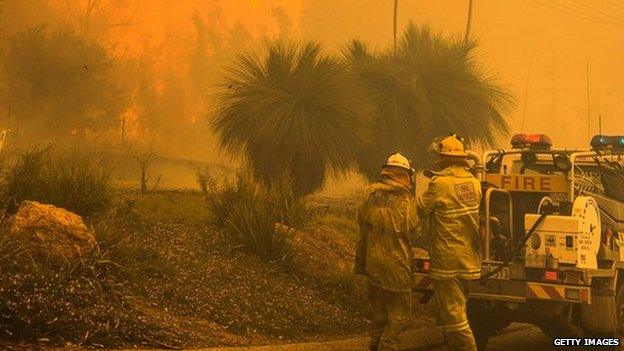
The bushfire - along with the shark - is a symbol of the threat from untamed forces of nature
Decades ago, Perth's small-town sense of safety was shattered by serial killer Eric Edgar Cooke. Nicknamed the "Night Caller", he terrorised Perth from 1959 to 1963, committing 22 violent crimes, including eight murders.
From then on, residents who usually left their homes unlocked at night and their car keys in the ignition changed their habits.
"This is the moment when people in Perth can no longer leave their doors and windows unlocked, can no longer allow their children to play in the streets," says Professor Stratton. "This moment keeps changing. It is always marked by some awful event."
There has always been a sense, he says, that nature has not been completely tamed.
"We get it here with bushfires, we get it with mosquitoes, sharks, but basically we are constantly under threat from nature, as if this city isn't securely anchored and could be wiped off the map almost at any time," he says.
"This is the point at which the myth of the threat of nature takes over from the myth of the laid-back, easygoing lifestyle of lying on the beach and swimming around in the blue sea."
- Published2 December 2014
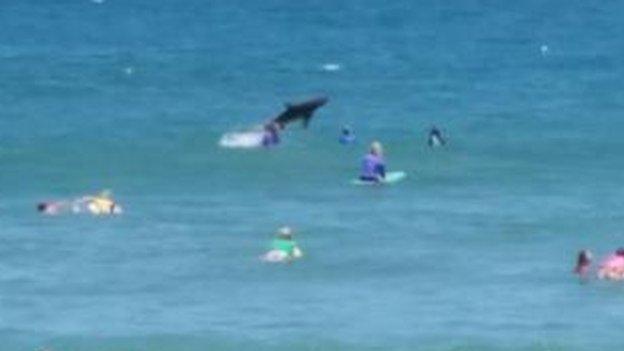
- Published31 March 2014
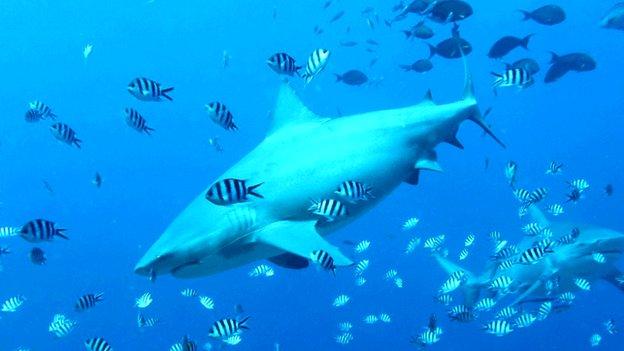
- Published17 July 2012
